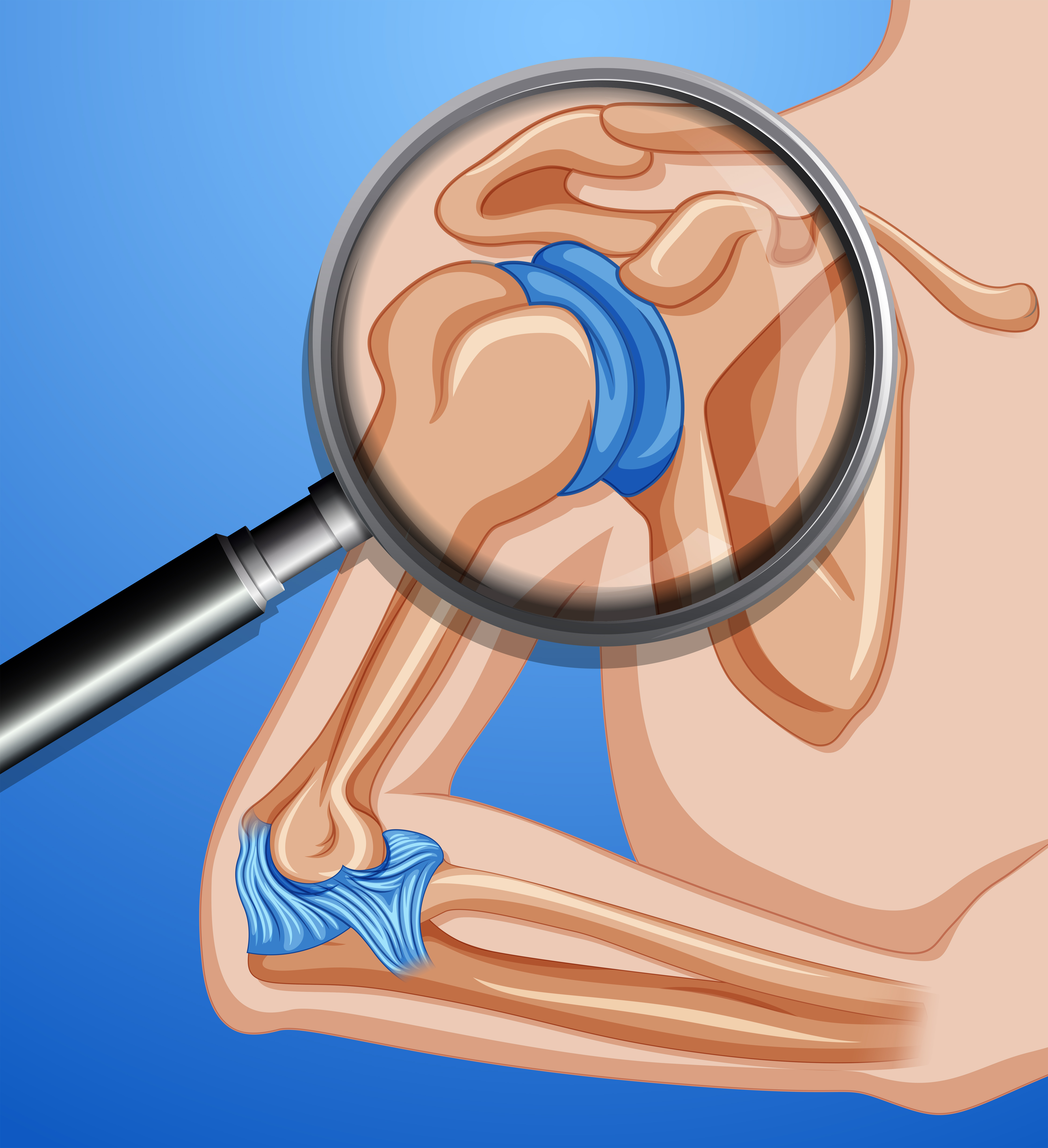5 Solutions to Shoulder Pain from Sleeping
16th May 2020

Have you ever had one of those nights where you slept in an awkward position and woke up in pain? You’re definitely not alone - it’s far more common than we realize.
Waking up with shoulder pain from sleeping can really start your day off on a downer. Sometimes it can even ruin the contentment that comes from a decent night’s rest.
Shoulders tend to be the most painfully affected joints by strange sleeping positions. Is there a way to fix this? A method to reduce the chances of hurting the joint while we’re fast asleep?
We’ve got 5 useful tips and tricks for you to try if your shoulder pain is becoming a problem. None of us enjoy being in pain, so why not give them a go and see if they help?
The Mechanics of Shoulder Pain
Before we dive in, let’s have a quick look at how the joint works and why it’s so susceptible to pain.
The Shoulder Joint
The shoulder joint has the widest range of motion out of all of them! It’s what’s known as a ball-and-socket joint, which means it is quite free to move around. Up, down, side to side, front to back, and rotating - it does it all!

Unfortunately, to allow for such movement we need to sacrifice some stability. This is why this particular area is prone to aches and pains - it’s a less stable joint than most, so it doesn’t take much to injure it.
There are many parts to this one ball-and-socket:
- The two bones that make up the joint (humerus and scapula).
- Muscles.
- Cartilage (covering the areas of the bones that meet).
- Joint capsule (a membrane which encloses the entire system).
- Bursae (fluid-filled structures that help cushion joints and tendons).
- Ligaments (connect bone to bone).
- Tendons (connect muscle to bone).
As you can see, that leaves many different parts that can become painful or get injured!
Common Root Causes of Shoulder Pain While Sleeping
Sometimes, sleeping wrong can be the cause of shoulder pain. Other times, there's an underlying problem causing the pain. The pain is worsened by your body’s position when sleeping.
Some common issues that cause aches include:
Injury
Shoulder injuries happen more frequently if you’re sporty or do physical work. But they can happen far more easily than we realize. Something as simple as leaning wrong on the counter can leave you with an out-of-place joint!
Even after injuries have healed, complications can stick around and cause grief. Some common injuries are:
- Rotator cuff injury (inflammation of the tendons in the joint).
- Muscle tears (a tear in the muscle fibers that needs treatment).
- Dislocation (the joint separates from the socket).
- Strains (from continuous poor posture).
Bursitis
If you haven’t injured yourself but are still feeling pain, you could be suffering from bursitis. It's often accompanied by swelling, stiffness, and redness.
This is when the little fluid-filled cushions in the joint become inflamed. As you can imagine, any movement makes it worse.
It’s treated with rest, anti-inflammatories, and physical therapy. In rare cases surgery is needed, but generally it’s a simple solution.
Overexertion
Ever heard of a stress fracture? They tend to occur often in the feet, because they’re exposed to long-term hard work and physical exertion.
This kind of thing can happen in any bone or joint, though!
If your shoulder tends to work a lot during the day, the pain you feel could simply be a bit of overexertion.
If you:
- Have a job that involves physical work.
- Make repetitive movements during your day (for example, digging).
… you could be more at risk for pain during the night.
It doesn’t have to be a long-term thing either. Just a day or two with prolonged use of the arms can bring up soreness and stiffness. Unfortunately, it can often stick around for far longer than it is welcome.
This is actually more common than you may think. Random things that can cause long-term aches are:
- Renovating or maintaining your home.
- A quick sprint to the bus stop.
- Starting a new sport.
- Getting too excited on the dance floor.
Other Conditions
Sometimes, an underlying medical condition can be the reason for our discomfort. If there is no other reason for your constant suffering, it’s worth asking your doctor about these.

5 Solutions to Shoulder Pain from Sleeping
These are not drastic changes. Implementing them in your daily life can make a huge improvement, though. You'll notice the change in how your shoulder feels when you wake up!
Change Your Sleeping Position
If you rolled your eyes at this one because, duh, we can’t control our movements when we sleep, we understand.
While this is a good point, there are some measures you can take. The key is to prevent rolling over onto your shoulder at night. You can:
- Place pillows behind your back or against the side you don’t want to roll onto.
- Get your partner to lie close behind you.
What Sleeping Positions Are Problematic?
Certain positions can be worse for your joint due to the position it gets forced into. Those include:
- On Your Side
If sleeping on the joint is what’s causing the pain in the first place, you’ll want to change so you aren’t hurting it anymore.
When sleeping wrong on the shoulder is what’s causing the pain, it’s advisable to change that!
- On Your Stomach
You may be wondering how stomach-sleeping can affect your shoulder. If you imagine how you might lie, your head will be turned to one side while asleep.
Now, while this won’t affect the shoulder specifically, it can cause some nasty neck pain. The body is a weird thing and likes to share pain where it can. This neck pain could manifest in the shoulder as something we call referred pain.
The nerves around the neck can begin to overcompensate for the aching neck joints. They can then become strained too! In turn, the shoulder starts to compensate. And so we end up with one thing leading to another.
What Sleeping Positions Should I Try?
Try these positions to improve neck and shoulder pain while sleeping:
- On The Other Side
If you really can’t fall asleep if you aren’t on your side, try lying on the non-painful side. There is a bit of a danger with this, though. If you switch sides for an extended period of time, you risk the same thing happening on both sides.
It’s a good idea to sleep on the other side until your pain has eased. Then, alternate sides to make sure neither one gets extra strained.
- On Your Back
This is the best position to sleep in to relieve this kind of pain. It’s a very neutral position and keeps all your joints positioned exactly as they should be.
Packing pillows on either side can keep you lying the same way comfortably once you’re asleep.
The Exception to the Rule
In rare cases, putting pressure on the joint can alleviate the pain. This is usually when the source of the pain is something like an injury.
If you know that the cause of your pain is something other than simply lying strangely on it, then you could try sleeping on the sore shoulder.
The pressure of lying on it can sometimes keep the joint more stable and make it feel better.
Of course, if you know your pain is caused by an injury you should see a doctor to see if there’s a better solution to fixing it!
Vid: https://www.youtube.com/watch?v=S613qj8XYbw
Apply Heat Before Bed
When you’re sore, the muscles can tighten up around the joint. Unfortunately, this often makes the pain worse.
Applying some heat can help tense muscles ease up and release some pressure on the aching joint.
Hot Shower
A hot shower works wonders for relieving muscle tension. The drumming of the water on your painful spot can also be a form of massage, which may help even more.
Hot Water Bottle
If you want to bring the heat with you into bed, a hot water bottle is a good idea. Make sure it’s not too warm - you’ll need to be able to hold it against your skin without burning.
Place it gently on the problem area and let the heat sink in. In conjunction with some slow stretches, this can be a great tension-reliever.
Heat Patches
For all-night-long warmth, you can purchase a heat patch. These contain chemicals that heat up when exposed to air, and should provide warmth for a good few hours.
Simply stick it directly on the affected area and let it do its thing. Make sure to follow the instructions! Also, if you sleep with a pet in the bed, you’ll want to be careful - make sure they can’t get to it or be exposed to the chemicals.

Rehabilitate With Training
It may sound backwards to actually exercise your sore shoulder. But, if you do it right, it can have a really positive impact!
The type of training we’re talking about is called rehabilitation training. We don’t advise throwing yourself into a strenuous gym routine with heavy weights! Start with things like:
- Yoga.
- Flexi bands.
- Stretches for the shoulders.
More in-depth treatments can include:
- Chiropractic adjustments.
- Light weights.
It’s also important to be aware of and adjust your posture when needed.

Be Mindful of What You Do During the Day
If your shoulder pain wears off as the day goes, you may not think twice about hitting the punching bag or weights after work.
But, if there’s an underlying problem, you could be making it worse without even realizing.
If shoulder pain is something you deal with on a daily basis, it’s worth examining your daily activities. This might help you to figure out what could be contributing.
Consider things like:
- High-power sports.
- Heavy physical work.
- Bad posture (for example, sitting in front of a computer every day)
The things that we do every day could be contributing more to our pain than we realize!
If you suspect this may be the case, take note of your daily activities. You may need to alter them for a while to allow your shoulder room to improve.
Buy a New Mattress
If you’ve tried a few remedies but have had no relief, you could literally be sleeping on your problem - the mattress.
The longer we sleep on the same mattress, the more it gets out of shape. This can force our bodies into unnatural positions without us even noticing!
Next time you get into bed, take note. Does the mattress sag in places? Has it lost its firmness? Are there dents or bumps in it that weren’t there when you got it?
All of these things can be contributing to your daily pain.
If you answered yes to any of those… It’s probably time to go shopping for a new one.

Conclusion
Shoulder pain from sleeping is a common occurrence, but it doesn’t have to be.
Be mindful of how you sleep, stay active, and make sure you give your body room to stretch. It will make a bigger difference to your sleep quality than you may realize!
These tips are easy to incorporate into your daily life. Give them a try and see how your shoulder pain improves!
Of course, another bonus is that when your pain improves, your mood does too. The knock-on effect extends to productivity, healthy eating habits, and fitness too!
Got another tip? Let us know in the comments.
Happy sleeping!












